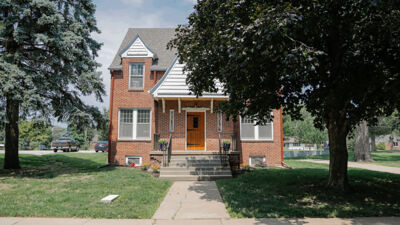Master’s in Early Childhood Education Jobs

Make a Difference and Grow in One of Many Master’s in Early Childhood Education Jobs
Are you thinking about pursuing a career in the early childhood education field? Now is a great time to make your move. In addition to the satisfaction of making a difference in young children’s lives, the early childhood education field is a growing one filled with rewarding master’s in early childhood education jobs that are projected to remain in steady demand.
Maybe you’ve wondered, “What can you do with a master’s in early childhood education?” If so, read on. You’ll learn more about the kinds of job opportunities a graduate degree from one of the best Christian early childhood education master’s programs can open for you, and what a master’s in early childhood education salary looks like. We’ll also review how to get a master’s degree in early childhood education that offers the strongest start to your teaching career.
Outlook on Master’s in Early Childhood Education Jobs
One of the largest advantages of master’s in early childhood education jobs is that they’re part of a relatively recession-proof field: As long as working adults have children, there will be demand for competent, compassionate teachers to educate and care for them. Demand for most master’s in early childhood education jobs are projected by the U.S. Bureau of Labor Statistics (BLS) to grow at a rate slightly faster than the average for the job market as a whole.
The preschool teacher role is expected to grow by 18% over the next decade, according to the BLS. Holding a master’s in early childhood education would place you among the most qualified teachers for most preschool positions—and it could qualify you for a higher master’s in early childhood education salary. The role’s projected high growth is likely attributed to the passage of universal pre-primary legislation in states such as Colorado, as well as consideration for universal pre-primary legislation at the federal level.
The demand for kindergarten teaching roles is expected to grow by 8% over the next decade, slightly faster than for most jobs. Their comparatively higher salaries are due to the credentials required for the job: a college degree and a teaching license. With an advanced degree, you’d be especially competitive for kindergarten teaching jobs and have a better chance of earning a higher master’s in early childhood education salary.
Elementary school teaching roles are projected to grow by 8% over the next decade. All elementary school teachers have at least an undergraduate degree in education, and many hold additional certifications and graduate degrees related to the subjects they teach. A degree from one of the nation’s best early childhood education master’s programs can help you stand out for roles in more competitive school districts and even put you in line for a higher master’s in early childhood education salary.
All of these positions offer opportunities to increase one’s earning potential and gain a more competitive master’s in early childhood education salary. For instance, most professionals in master’s in early childhood education jobs can increase their earning potential by pursuing special education certification for the age range that they teach.
Titles and Career Paths for Master’s in Early Childhood Education Jobs
What can you do with a master’s in early childhood education? The answer is a whole lot. With an advanced teaching degree, you’ll have the opportunity to pursue a variety of master’s in early childhood education jobs, including:
- Preschool teacher: The average preschool teacher holds an associate degree in early childhood education and makes roughly $32,000 a year, according to the BLS. Preschool teachers work with very young children to help them absorb fundamental knowledge and the basics of polite behavior in order to prepare for kindergarten.
- Kindergarten teacher: Kindergarten teachers earn $60,660 a year on average. They work with young children to teach them basic knowledge, mannered behavior, and get them prepared to enter grade school.
- Early childhood special education teacher: On average, teachers who specialize in working with special-needs populations earn an annual salary of $61,500. Early childhood special education teachers work with students who have exceptional learning needs. These teachers often collaborate with school administrators and health professionals to foster inclusive learning environments and meet the requirements and goals of each student’s individualized education plan.
- Elementary school teacher: Elementary school teachers earn an average of $60,940 per year. They work with kids of a variety of ages to teach foundational to basic knowledge in a variety of core subjects. Many teachers in the field will focus their teaching within a certain grade level, though occasionally switching to teach different grade levels is not uncommon.
- TESL teacher: On average, professionals who teach English as a second language make $56,000 per year. According to the BLS, there are more than 5,000 openings for TESL teachers available every year in the U.S., as well as significant demand abroad. TESL teachers work with ESL learners in a variety of settings, from school and community college classrooms to public organizations. Most TESL teachers are fluent in a second language and teach students who are native speakers in it.
Earning an advanced degree not only makes you more competitive for master’s in early childhood education jobs, it also has a tangible effect on your earning potential.
FAQ About Master’s in Early Childhood Education Jobs
How Do Master’s in Early Childhood Education Jobs Compare with the Opportunities in Primary and Secondary Education?
Job opportunities in early childhood education are expected to surpass those available in primary and secondary education. In fact, the early childhood education field is predicted to see more growth in jobs than any other level of education in the coming decade, according to the BLS.
Primary and secondary school teachers have slightly higher average salaries than those of kindergarten teachers. According to the BLS, here’s what the average teacher at every level of schooling earns in a year:
• Kindergarten: $60,660
• Elementary: $60,940
• Middle school: $60,810
• High school: $62,870
Can a Master’s in Early Childhood Education Really Increase My Salary Potential?
What can you do with a master’s in early childhood education? Make a better salary. Earning an advanced degree not only makes you more competitive for master’s in early childhood education jobs, it also has a tangible effect on your earning potential. According to the National Council for Teacher Quality, first-year teachers with advanced degrees earn an average of $2,700 more than first-year teachers with bachelor’s degrees. Extend that advantage further up the tenure ladder and teachers with advanced degrees out-earn their bachelor’s-holding colleagues by more than $7,300 per year by the time they reach the maximum point on the pay scale. Continue reading below to learn how to get a master’s degree in early childhood education.
Will I Have to Put My Career on Hold to Pursue a Master’s in Early Childhood Education?
Not at all. Some of the best early childhood education master’s programs in the country offer online programs that you can take at a pace that fits your career and life. Concordia University, Nebraska, for instance, organizes its online program into eight-week courses that are easy to schedule and accommodating to the needs of its professional students.
I Don’t Know if I Can Afford to Pursue an Advanced Degree. How Could I Pay for It Without Taking on Loans?
If you’re willing to teach full time for four years post-graduation in a high-need field at a public or private school or educational service agency that serves low-income students, you could be eligible for up to $4,000 a year in support through the federal government’s TEACH grant program.
Advance Your Teaching Career at One of the Best Early Childhood Education Master’s Programs
Now that you know just how much opportunity exists for fulfilling careers in the early childhood education field, why not get started acquiring the knowledge you need to get into the classroom?
Concordia Nebraska is one of the nation’s premier Lutheran universities and offers one of the best early childhood education master’s programs. Our degree program can prepare you to be a skilled, confident educator in whichever age range of children you feel called to teach. Our curriculum is rooted in Christian values, so you can trust that the teaching strategies you’ll learn are based on the highest ethics.
Whether you’re a high school graduate looking to earn your teaching license for the first time or a veteran educator looking to switch to a new age group or teaching specialty, we offer high-quality courses in the supportive environment you need to achieve your goals. Learn more about how to get a master’s degree in early childhood education at Concordia.
Related Stories


